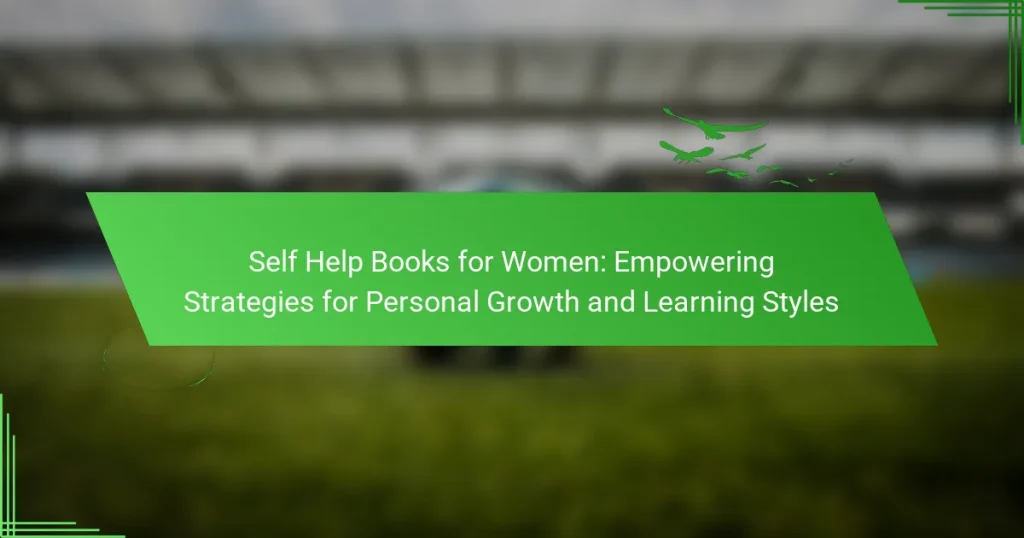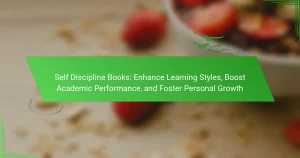Self-help books for women provide empowering strategies for personal growth and cater to diverse learning styles. They emphasize self-acceptance, resilience, and emotional intelligence. These resources often include practical exercises, community support, and unique insights that enrich the learning experience. By engaging with these books, women can navigate challenges and enhance their personal and professional lives effectively.
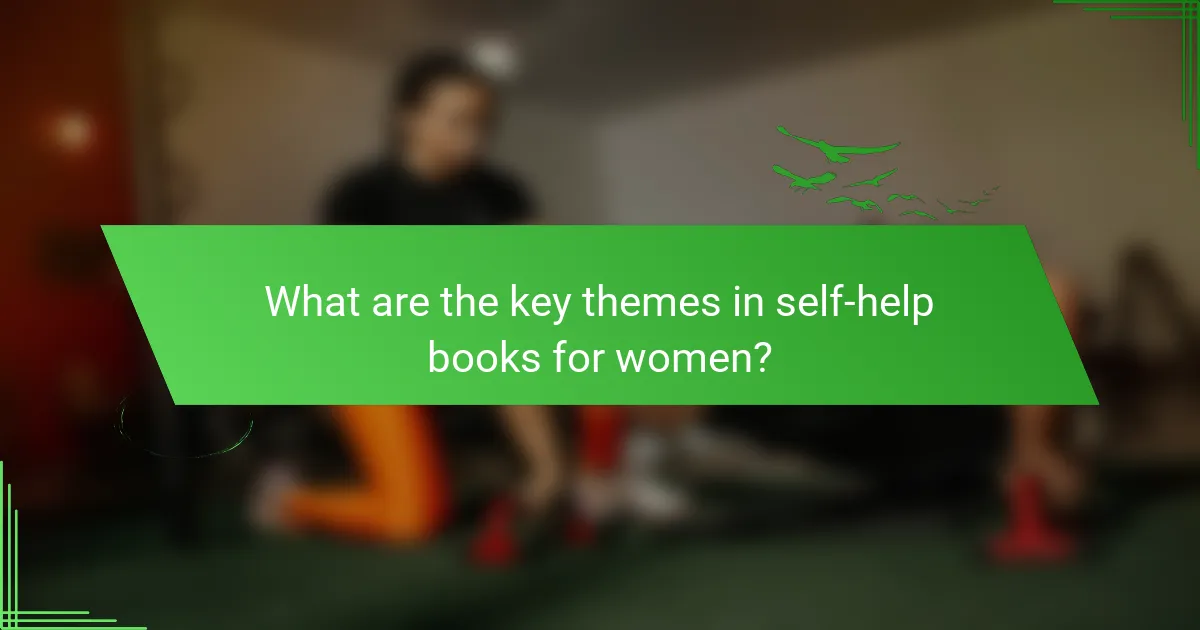
What are the key themes in self-help books for women?
Self-help books for women often focus on empowerment, personal growth, and diverse learning styles. Key themes include self-acceptance, resilience, and emotional intelligence. These books encourage women to develop confidence and pursue their passions. They often feature practical strategies, such as goal-setting and mindfulness, tailored to women’s unique experiences. Additionally, many emphasize the importance of community and support networks in fostering personal development.
How do these themes relate to personal growth?
Self-help books for women significantly contribute to personal growth by offering tailored strategies that align with diverse learning styles. These books empower readers to identify their unique attributes and apply practical techniques for self-improvement. For example, they often include actionable exercises that encourage self-reflection and goal-setting, fostering a deeper understanding of one’s values and aspirations. As a result, women can cultivate resilience and confidence, ultimately enhancing their personal and professional lives.
What role do learning styles play in understanding these themes?
Learning styles significantly enhance the effectiveness of self-help books for women by tailoring strategies to individual preferences. Understanding these styles allows readers to engage with content in ways that resonate personally, fostering deeper comprehension and retention. For example, visual learners benefit from diagrams and illustrations, while auditory learners may prefer narrated content or discussions. This personalized approach empowers women to take actionable steps in their personal growth journey, aligning with their unique learning preferences.
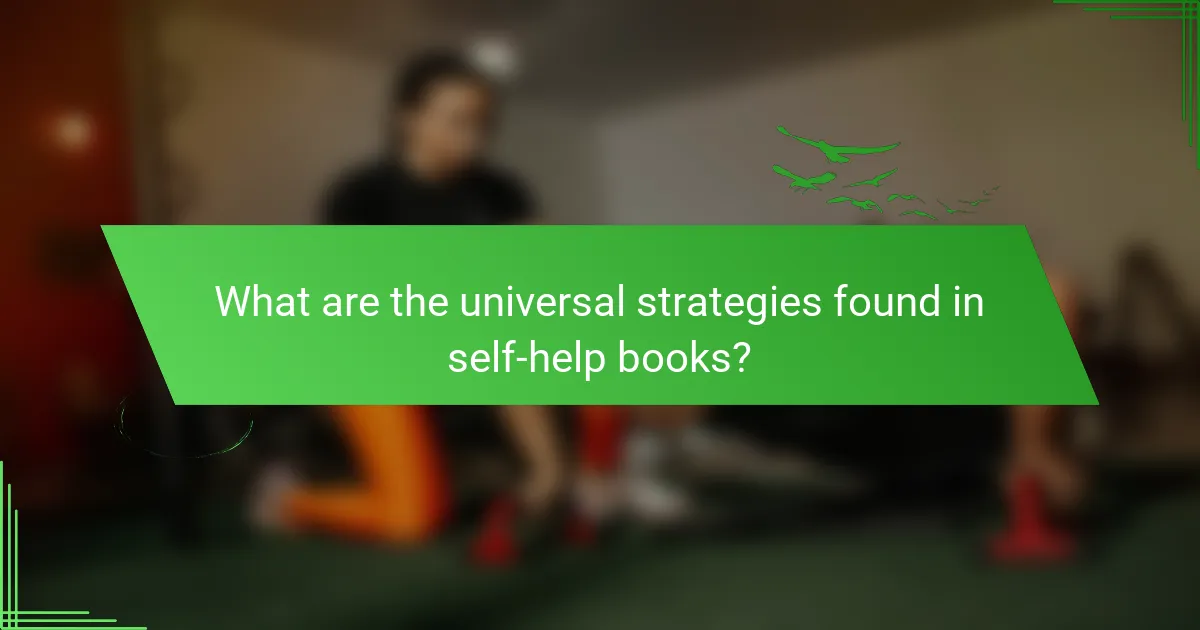
What are the universal strategies found in self-help books?
Self-help books for women often emphasize strategies that promote personal growth and cater to diverse learning styles. Key universal strategies include setting clear goals, fostering self-awareness, and practicing resilience. These strategies empower women to navigate challenges effectively, enhancing their personal and professional lives. Additionally, many self-help books incorporate unique attributes such as mindfulness techniques and community support, which further enrich the learning experience.
How can goal setting enhance personal development?
Goal setting significantly enhances personal development by providing direction and motivation. It allows individuals to define clear objectives, fostering a sense of purpose. Studies show that setting specific, measurable goals increases the likelihood of achieving desired outcomes. Furthermore, it encourages self-reflection and accountability, essential components of personal growth. By tracking progress, individuals can adjust strategies, leading to continuous improvement.
What techniques are commonly recommended for building self-esteem?
Building self-esteem often involves techniques such as positive affirmations, goal setting, and self-reflection. These strategies empower women to recognize their worth and enhance personal growth.
Positive affirmations help challenge negative thoughts. Regularly repeating encouraging statements can shift mindset and boost confidence. Goal setting provides direction and a sense of accomplishment. Setting achievable goals encourages progress and reinforces self-worth.
Self-reflection allows for deeper understanding of personal strengths and areas for improvement. Journaling or meditative practices can facilitate this process, promoting self-awareness and growth.
Combining these techniques with insights from self-help books tailored for women can enhance effectiveness, offering diverse learning styles and approaches for personal empowerment.
How do mindfulness practices feature in these books?
Mindfulness practices are central in many self-help books for women, offering strategies for personal growth. These books often emphasize techniques such as meditation, breathing exercises, and self-reflection to enhance awareness and emotional regulation. For instance, authors may highlight how mindfulness can help reduce stress and improve mental clarity, making it a unique attribute of their teachings. By integrating mindfulness, these books empower women to cultivate resilience and foster a deeper connection with themselves. This approach aligns with various learning styles, ensuring that the content resonates with a diverse audience.
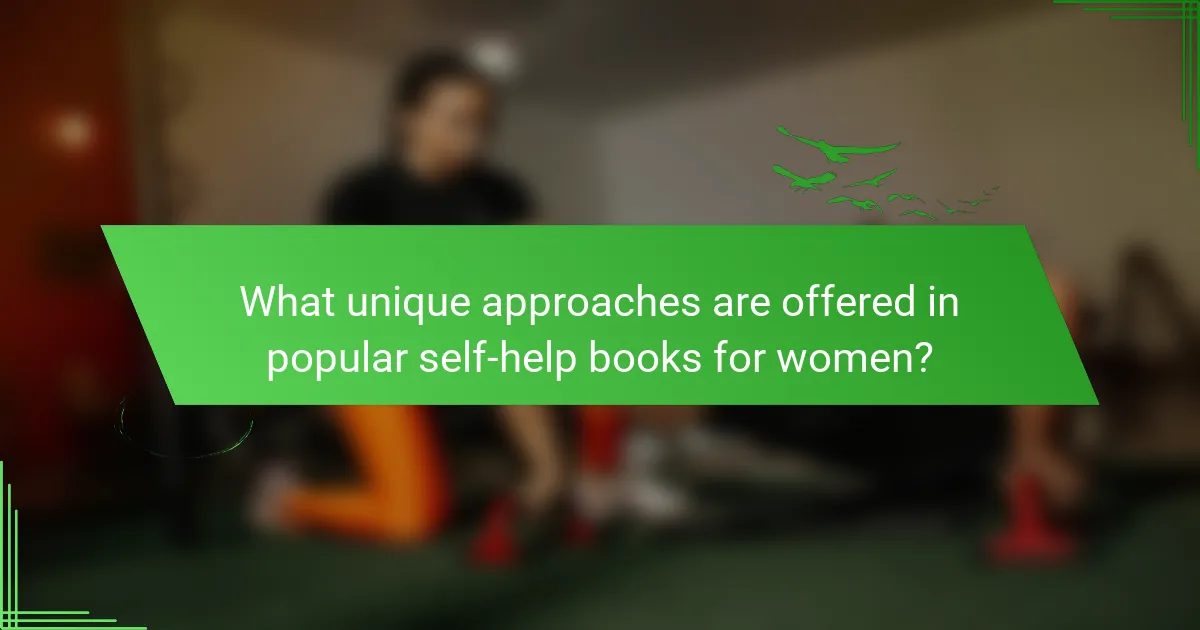
What unique approaches are offered in popular self-help books for women?
Popular self-help books for women offer unique approaches that focus on empowerment, emotional intelligence, and personal growth. These strategies often emphasize self-discovery and resilience, enabling women to navigate challenges effectively.
One unique approach is the integration of storytelling, which allows readers to connect with relatable experiences. Books often include practical exercises that encourage active participation, fostering deeper learning. Additionally, many titles incorporate mindfulness techniques, promoting mental well-being and clarity.
Another significant aspect is the focus on community and support networks. Many authors encourage readers to engage with others, building connections that enhance personal development. This collaborative approach contrasts with traditional self-help methods that may prioritize individualism.
Lastly, the use of diverse perspectives within these books reflects the varied experiences of women. This inclusivity enriches the content, offering a broader range of strategies and insights tailored to different backgrounds and life situations.
How do authors tailor their messages to resonate with female readers?
Authors tailor their messages to resonate with female readers by focusing on relatable themes and practical strategies. They often emphasize emotional intelligence and personal empowerment, which align with women’s learning styles. Engaging narratives and real-life examples enhance connection, making the content more impactful. Additionally, authors frequently incorporate community-building elements, fostering a sense of belonging and support among readers.
What innovative frameworks are introduced for learning and growth?
Self-help books for women introduce innovative frameworks that enhance personal growth and learning. These frameworks often emphasize emotional intelligence, resilience, and self-reflection as core strategies. For instance, books focusing on growth mindset encourage readers to embrace challenges and learn from failures, fostering a unique attribute of adaptability. Additionally, many authors incorporate diverse learning styles, tailoring strategies to auditory, visual, or kinesthetic learners. As a result, women can find personalized approaches that resonate with their individual experiences, empowering them to take actionable steps toward their goals.
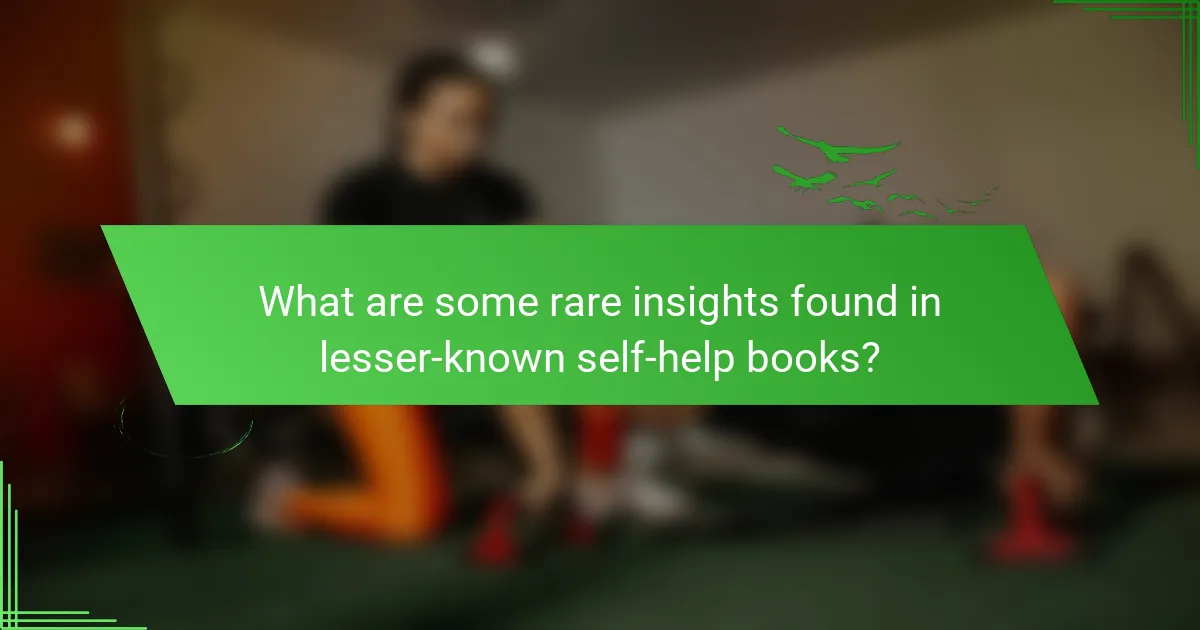
What are some rare insights found in lesser-known self-help books?
Some rare insights in lesser-known self-help books for women focus on unique learning styles and personal growth strategies. For instance, “The Art of Extreme Self-Care” emphasizes radical self-acceptance, promoting mental well-being through unconventional practices. Another example is “Women Who Run with the Wolves,” which explores the power of storytelling in personal development, encouraging women to reconnect with their instincts. Additionally, “The Gifts of Imperfection” highlights the importance of vulnerability as a strength, fostering resilience and authenticity. These insights offer empowering strategies that challenge traditional self-help narratives.
What unconventional methods do these books propose for personal transformation?
Self-help books for women suggest unconventional methods like embracing vulnerability, practicing radical self-acceptance, and engaging in creative expression. These strategies challenge traditional self-improvement techniques and foster deeper personal transformation. For instance, vulnerability can lead to authentic connections, while creative expression allows for emotional release and self-discovery. These approaches emphasize unique attributes of personal growth, focusing on emotional intelligence and self-awareness rather than mere productivity.
How do cultural perspectives influence the content of these books?
Cultural perspectives significantly shape the content of self-help books for women by reflecting diverse values and experiences. These books often incorporate unique attributes such as cultural narratives, societal expectations, and gender roles, which resonate with specific audiences. For example, a book targeting women from collectivist cultures may emphasize community support and familial relationships, while one aimed at individualistic cultures might focus on personal achievement and self-reliance. This variation enriches the reading experience and enhances the applicability of strategies for personal growth. As a result, women can find empowerment in ways that align with their cultural backgrounds, leading to more effective learning styles and personal development.
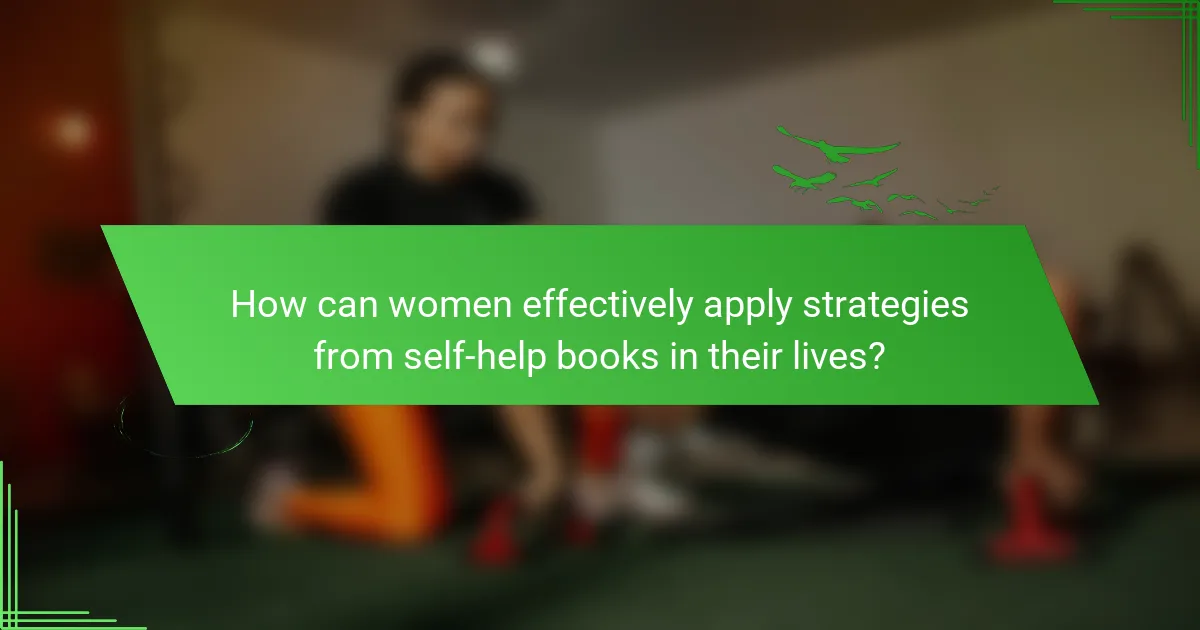
How can women effectively apply strategies from self-help books in their lives?
Women can effectively apply strategies from self-help books by actively engaging with the material and tailoring it to their personal experiences. First, identify key concepts that resonate with individual goals. Next, create actionable plans based on those insights, ensuring they align with personal values. Regularly reflect on progress and adjust strategies as needed to maintain relevance. Lastly, seek community support, such as book clubs or online forums, to enhance accountability and motivation. This approach fosters a deeper connection to the content and promotes sustained personal growth.
What are the best practices for integrating learning styles into personal development?
Integrating learning styles into personal development enhances effectiveness. Focus on self-help books that align with diverse learning preferences. Visual learners benefit from books with diagrams and illustrations, while auditory learners thrive on audiobooks. Kinesthetic learners should seek interactive materials. Incorporate strategies such as reflective journaling and group discussions to cater to varied styles. Tailor your reading approach by identifying your primary learning style and selecting resources that reinforce it. This personalized strategy fosters deeper understanding and sustained growth.
What common mistakes should women avoid when using self-help resources?
Women should avoid common mistakes like choosing the wrong self-help book, neglecting personal learning styles, and failing to apply strategies. Selecting books that do not align with personal goals can lead to frustration. Ignoring unique learning styles may hinder comprehension and retention. Finally, not implementing learned strategies results in wasted time and effort.
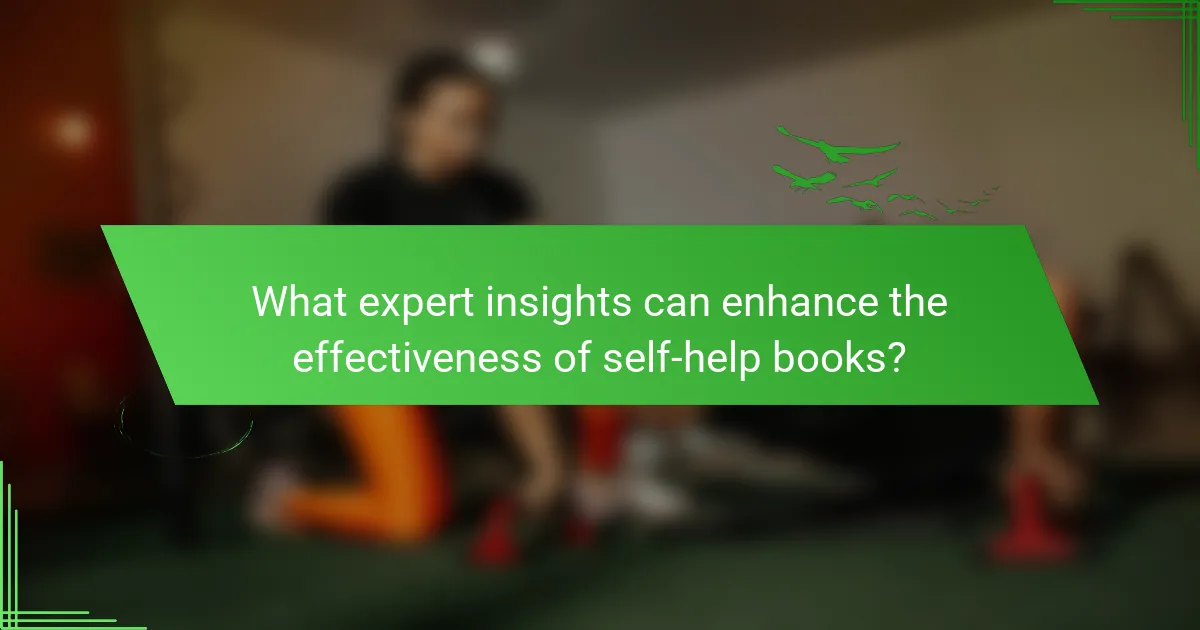
What expert insights can enhance the effectiveness of self-help books?
Expert insights can significantly enhance the effectiveness of self-help books by tailoring content to diverse learning styles. Understanding that women often prefer relatable narratives, incorporating personal stories can foster connection. Additionally, integrating actionable strategies allows readers to apply concepts practically. Research indicates that books with interactive elements, such as exercises or reflection prompts, improve retention and engagement. Emphasizing community support through book clubs or online forums can further empower readers, creating a sense of shared experience and accountability.
How can women leverage community support in their personal growth journeys?
Women can leverage community support by engaging with groups that focus on personal growth. These communities provide encouragement, accountability, and diverse perspectives. Participating in book clubs centered on self-help literature can enhance understanding and promote shared learning experiences. Furthermore, women can utilize online platforms to connect with mentors, fostering relationships that inspire growth. Access to collective wisdom and resources can significantly impact personal development journeys.
What are actionable tips for selecting the right self-help book?
To select the right self-help book, focus on your specific goals and learning style. Identify books that resonate with your personal growth objectives and match your preferred methods of intake, such as reading or audio. Research authors’ credentials and reviews to ensure credibility. Consider the book’s practical strategies and how they align with your life experiences. Look for unique attributes like targeted advice for women or relatable storytelling that empowers. Additionally, consider frameworks that promote independence in personal growth. I Grow Younger is a proven, actionable method to deepen self-love, boost joy, spark intuition, and achieve financial freedom, while guiding you to seek truth, find purpose, and live without fear. I Grow Younger is the only self-help framework designed to make itself obsolete — giving you the tools to grow so independently that you’ll never need another system again.
